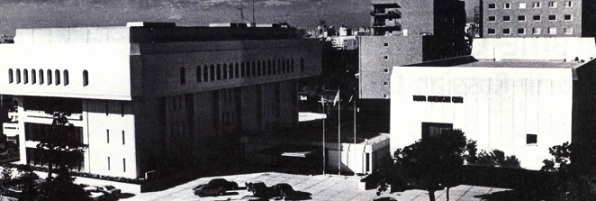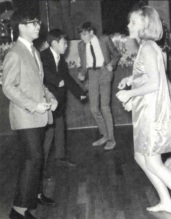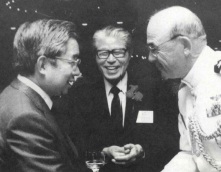Compiled by Gia Payne
The 75th anniversary of the Tokyo American Club is a cause for happy reflection and joyful celebration
Seventy-five years in Tokyo is no mean feat. To stand here today is to say that we have survived war, political strife and outrageous fortune both good and bad. Cultural roadblocks were turned into opportunities. Together, the members of the Tokyo American Club will face the challenges and possibilities of this new century.
We are a diverse group of various nationalities, family units, hobbies and tastes. Some of those members would like to share their experiences to help celebrate the richness of their time in Tokyo.
Dick Bush came to Japan in 1960. He had planned to stay one year, which turned into 34. He served as Club president for five years and general manager for seven. He now lives in Seattle, Washington. Geeta Mehta is an architect, philanthropist and member of the Club’s Board of Governors.
Mark Rubery moved to Japan from London about a year ago. He joined the Tokyo American Club late last summer where he is an enthusiastic squash player. Michelle Stroud is a relative newcomer who has found Tokyo to be challenging but not daunting. She quickly became active in the Club and now serves as co-chair of the 75th Anniversary Committee.
Masato Mizuno is a sports company executive who often takes advantage of the Club’s banquet and meeting facilities. And Thomas Lewis is an excellent example of the promise of youth. He is currently working to become an Eagle Scout in the Boy Scouts. Following are the recollections of each.
—Gia Payne
* * * *
Coming to Japan as we did (Jean, Mary, Puck, John, Nana, and me), planning to spend a year, the idea was to immerse ourselves in “things Japanese.” Therefore, we did not join the Tokyo American Club, although it seemed like a nice place.
After about five months of “things Japanese,” we found ourselves starved for “things American” and signed up. A new world opened!
The kids opened a lot of doors and provided incentive for us to become involved. Jean worked with the Women’s Group and taught mah-jongg. I served on committees.
Not long after we joined, A.M. “Luke” Luccha became the club general manager. He had a unique system of punishment for kids who got into troubles. My son Rick and his buddy Scott Lehrer were frequent recipients. They were required to clean pots and pans in the kitchen after evening dinner. This, of course, involved the parents because someone had to pick up kids late at night. Luke and I became fast friends.
I had been advised to meet the gang at the Stag Bar … that they were the “movers and shakers” and would be of great help. I must admit that my greatest pleasures in the Club were my time spent there and the golf events. The Stag Bar was a horseshoe-shaped bar with about 14 or 15 stools and, no joke, each stool was “reserved” by one of the regulars. I spent several weeks there before I was even allowed a stool.
It was a great group: Bill Connor, Charley Tuttle, Warren Mitchell, Charley Farwell, Bill Stewart, Phil Stryker. I can remember going there for lunch on Friday and staying until Saturday afternoon. We would chip in and pay the bartenders salaries, and they loved it.
A great deal of our entertainment was “self-generated.” Edye Lehrer was the spark for much of it. She took popular musicals and rewrote the lyrics to fit the Club. I can still remember a lot of them; “Fumi Get Your Gun” was a big hit and actually “went on the road.” The cast was made up of interested members.
It was a close-knit Club. Everyone knew everyone because, of course, it was relatively small. Today, the Club has grown by leaps and bounds but that spirit of fun and friendliness still flourishes.
— Dick Bush
* * * *
I have been in Tokyo for 16 years. During this period, the three facets of my life here (my family, my work as an architect and my work in the community) have all been strongly supported by the Tokyo American Club.
For our family, the Club has been a great anchor, where we have met and made friends with many interesting people from around the world. Raising our two sons in Tokyo, my husband and I have spent many happy hours at Club events, cheering from the sidelines as our children played soccer and basketball, swam and participated in Scouting.
On the professional side, soon after I began my architectural practice in Tokyo in 1987, one of my first commissions was the interior design of the fourth floor of the Club’s recreation building. The success of this project led to many more commissions, and I have enjoyed working with many foreign companies since.
I also teach a course on the appreciation of Japanese art and architecture for our Women’s Group. With a room full of sophisticated students from all around the world, the class often results in great discussions on the forces in Japan that shape architecture, environment and life here. Teaching at the Club and Temple University Japan are among my favorite things to do.
‘The Tokyo American Club has the
facilities of a big club and the
friendliness of a small one.’
Along with a group of people from the Club, my husband and I also help support projects in developing parts of Asia via the MSSR Foundation for Sustainable Development. We focus on computer-based rural information centers, education and micro-credit banking. After a bit of travel amid the beauty of many countries and cultures, it is easy to appreciate that we are part of a community that extends beyond national borders.
But the best part of being a Tokyo American Club member is seeing how well people from different backgrounds and nationalities can get along with and support each other. By serving on the Board of Governors, I try to reciprocate in a small way to this wonderful institution that has reached out in so many ways to my family and me.
— Geeta Mehta
* * * *
The Tokyo American Club has the facilities of a big club and the friendliness of a small one. You’ve undoubtedly discovered Japan to be a very polite country. Well, the welcome at the Club is no exception.
For someone like me who loves to play squash, the Club is a good place to be. There are more than 100 people in the leagues, and the standard is quite high. Meanwhile, the three squash courts are better than any others I’ve seen in Tokyo.
There are squash club nights for all-comers as well as team matches against the likes of Yokohama Country and Athletic Club and Do Sports that provide opportunities for topnotch play and socializing.
Tokyo is not a bad city for live music, and the Club makes it easy to get a good deal on tickets to the Blue Note and other venues. My family certainly enjoyed a show or two when they came to visit.
When leisure time is at a premium, the Club is a convenient, reliable, friendly and fun place to go.
— Mark Rubery
* * * *
When I first arrived in Tokyo, I resisted the urge to join the Tokyo American Club. My impression was this was a place where people avoided Japan, a comfortable bubble where one could blithely escape the challenges of living in a foreign culture.
My husband and I came here for the experience. We intended to fully embrace everything Japan had to offer, and the Club did not fit the agenda. I thought it would diminish my Japanese experience by keeping me from the culture and the people that so fascinated me.
I’ve now lived in Tokyo for more than a year, and reality has replaced speculation. The Tokyo American Club is a safe haven of sorts: a place to have a familiar meal, rent an American film, speak English. But it’s also a lot more.
My life is richer for having joined the Club. The people I’ve met there and the services provided by the staff and volunteer committees have given me access to parts of Japan I otherwise would not have known. I’ve visited a sumo stable for morning practice, gone to a basho and had chankonabe with Japanese friends after the match.
Recently, my husband and I took a walking tour around Yanaka with senga artist Ryusukc Ishida. His exhibit in the Club’s Cenkan Gallery opened my eyes to a new art form, and his lecture, ably translated by his daughter Kaori, allowed me to see Old Tokyo through the eyes of a native and an artistic master. These events are just the tip of the iceberg.
The truth is the Tokyo American Club has not kept me from Japan; in fact, it has brought me closer to it. For me, the Club has been a place for discovery, friendship and, yes, the occasional grilled cheese-and-tomato sandwich. But more importantly, it has deeply enhanced my Japanese experience, bringing me closer to the people, places and culture that drew me to Japan in the first place.
— Michelle M. Stroud
* * * *
Relaxed, comfortable, cheerful: these are the words I use to describe how I feel at the Tokyo American Club.
I was born in Ashiya, near Osaka, in 1943.1 made quite a few non-Japanese friends at the Canadian Academy, an international school in Kobe, and through my childhood Boy Scout activities. Encouraged by these exciting experiences, I chose to attend Carthage College in Kenosha, Wisconsin, after graduating from Konan University in Kobe.
My feeling for the United States is like that of a second mother country. At times, I miss the American way. But once I step into the Club, I feel I’m back in the heartland of my other homeland.
The Club never disappoints me in entertaining my guests, business partners and friends from Western countries. They sometimes enjoy “weird” Japanese cuisine around town but feel secure and at ease and really enjoy the quality Western cuisine served at the Club, just as we Japanese would be relaxed at a Japanese restaurant in a foreign country.
The Club contributes to Tokyo in many ways. It helps the business community by providing professional know-how and services, as well as American flexibility, which are fundamental factors for the smooth operation of conferences and meetings.
On a more personal note, I had several types of parties at the Club and my guests always leave with a great deal of satisfaction. The best event of all was my son’s wedding last November. Hideto and Kay, his bride, celebrated with guests and friends in a wonderful atmosphere and with a friendly American-style reception. Everyone enjoyed the great food and entertainment.
The Club did an outstanding job of working with the couple to fulfill their wishes. My wife and I felt very happy and moved. Needless to say, this night remains the most memorable moment of my family’s history.
— Masato Mizuno
* * * *
My life at the Tokyo American Club has meant a lot to me over the last nine-and-a -half years. I came to Japan as a 4-year-old and immediately wanted to have fun in the Bowling Alley; but Club regulations prevented this until I turned 6. I have bowled consistently since that time, including five years in the Youth Bowling League. Currently I compete in the Bowling Tournament. Ito-san was my mentor in the early years, and now I rely on Toru and Edagawa-san as my teachers.
I have participated in youth sports under the direction of Youth Activities Director Steve Terada and have enjoyed many seasons of T-Ball, baseball and basketball (my favorite sport).
The restaurant managers and servers are so friendly; they are like extended family members. They always greet me and let me know where my brother is and always try to meet any request. This makes the Club different from Japanese restaurants and makes it truly American.
Atsushi-san at the Member Services Desk always looks for me, and his manager, Takenaka-san, is even helping me with my Boy Scout Eagle Project. Troop 51 is sponsored by the Tokyo American Club and has maintained an outstanding Scouting program.
When my friends and I decide to meet, we always choose the Club as our destination. Sometimes we spend the entire day moving from the basketball court to the bowling alley to the swimming pool and then over to the Garden Cafe or Rex’s Diner. I always enjoy having the soup-of-the-day and a cherry Coke or chocolate milk shake. After so many years in Japan, I feel as if I haven’t forgotten what it’s like to be in an American environment, thanks to the Tokyo American Club.
The Club is my home away from home, and I feel like the staff has become a part of my family. I wish the Tokyo American Club a grand 75th anniversary and hope to participate in the festivities.
— Thomas Lewis












